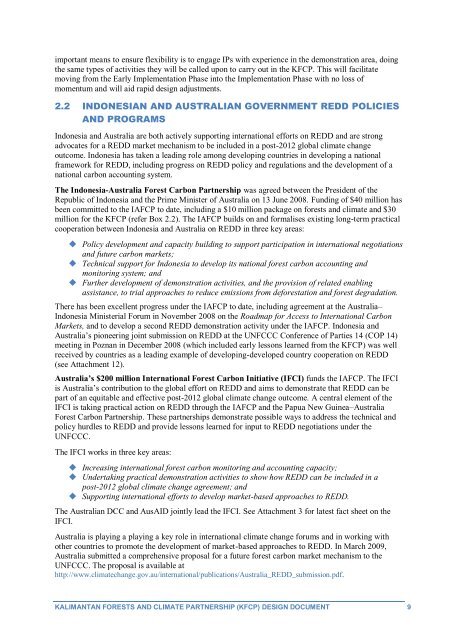Kalimantan Forests and Climate Partnership (KFCP) Design ...
Kalimantan Forests and Climate Partnership (KFCP) Design ...
Kalimantan Forests and Climate Partnership (KFCP) Design ...
You also want an ePaper? Increase the reach of your titles
YUMPU automatically turns print PDFs into web optimized ePapers that Google loves.
important means to ensure flexibility is to engage IPs with experience in the demonstration area, doing<br />
the same types of activities they will be called upon to carry out in the <strong>KFCP</strong>. This will facilitate<br />
moving from the Early Implementation Phase into the Implementation Phase with no loss of<br />
momentum <strong>and</strong> will aid rapid design adjustments.<br />
2.2 INDONESIAN AND AUSTRALIAN GOVERNMENT REDD POLICIES<br />
AND PROGRAMS<br />
Indonesia <strong>and</strong> Australia are both actively supporting international efforts on REDD <strong>and</strong> are strong<br />
advocates for a REDD market mechanism to be included in a post-2012 global climate change<br />
outcome. Indonesia has taken a leading role among developing countries in developing a national<br />
framework for REDD, including progress on REDD policy <strong>and</strong> regulations <strong>and</strong> the development of a<br />
national carbon accounting system.<br />
The Indonesia-Australia Forest Carbon <strong>Partnership</strong> was agreed between the President of the<br />
Republic of Indonesia <strong>and</strong> the Prime Minister of Australia on 13 June 2008. Funding of $40 million has<br />
been committed to the IAFCP to date, including a $10 million package on forests <strong>and</strong> climate <strong>and</strong> $30<br />
million for the <strong>KFCP</strong> (refer Box 2.2). The IAFCP builds on <strong>and</strong> formalises existing long-term practical<br />
cooperation between Indonesia <strong>and</strong> Australia on REDD in three key areas:<br />
Policy development <strong>and</strong> capacity building to support participation in international negotiations<br />
<strong>and</strong> future carbon markets;<br />
Technical support for Indonesia to develop its national forest carbon accounting <strong>and</strong><br />
monitoring system; <strong>and</strong><br />
Further development of demonstration activities, <strong>and</strong> the provision of related enabling<br />
assistance, to trial approaches to reduce emissions from deforestation <strong>and</strong> forest degradation.<br />
There has been excellent progress under the IAFCP to date, including agreement at the Australia–<br />
Indonesia Ministerial Forum in November 2008 on the Roadmap for Access to International Carbon<br />
Markets, <strong>and</strong> to develop a second REDD demonstration activity under the IAFCP. Indonesia <strong>and</strong><br />
Australia‘s pioneering joint submission on REDD at the UNFCCC Conference of Parties 14 (COP 14)<br />
meeting in Poznan in December 2008 (which included early lessons learned from the <strong>KFCP</strong>) was well<br />
received by countries as a leading example of developing-developed country cooperation on REDD<br />
(see Attachment 12).<br />
Australia’s $200 million International Forest Carbon Initiative (IFCI) funds the IAFCP. The IFCI<br />
is Australia‘s contribution to the global effort on REDD <strong>and</strong> aims to demonstrate that REDD can be<br />
part of an equitable <strong>and</strong> effective post-2012 global climate change outcome. A central element of the<br />
IFCI is taking practical action on REDD through the IAFCP <strong>and</strong> the Papua New Guinea–Australia<br />
Forest Carbon <strong>Partnership</strong>. These partnerships demonstrate possible ways to address the technical <strong>and</strong><br />
policy hurdles to REDD <strong>and</strong> provide lessons learned for input to REDD negotiations under the<br />
UNFCCC.<br />
The IFCI works in three key areas:<br />
Increasing international forest carbon monitoring <strong>and</strong> accounting capacity;<br />
Undertaking practical demonstration activities to show how REDD can be included in a<br />
post-2012 global climate change agreement; <strong>and</strong><br />
Supporting international efforts to develop market-based approaches to REDD.<br />
The Australian DCC <strong>and</strong> AusAID jointly lead the IFCI. See Attachment 3 for latest fact sheet on the<br />
IFCI.<br />
Australia is playing a playing a key role in international climate change forums <strong>and</strong> in working with<br />
other countries to promote the development of market-based approaches to REDD. In March 2009,<br />
Australia submitted a comprehensive proposal for a future forest carbon market mechanism to the<br />
UNFCCC. The proposal is available at<br />
http://www.climatechange.gov.au/international/publications/Australia_REDD_submission.pdf.<br />
KALIMANTAN FORESTS AND CLIMATE PARTNERSHIP (<strong>KFCP</strong>) DESIGN DOCUMENT 9

















